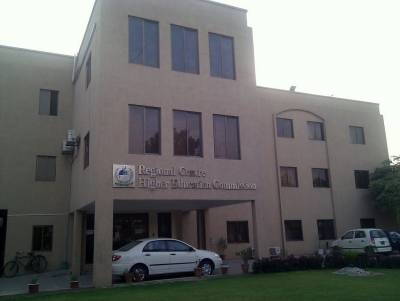
Lahore – Poor quality standard at 13 universities has led the Higher Education Commission (HEC) to suspend admissions for their MPhil and PhD distance learning programmes, a decision that will affect nearly 4,000 students.
After physical visits and documents’ review, a committee of HEC experts has concluded that the 13 universities lacked adequate faculty to run the MPhil and PhD programmes, read a circular sent to the universities by HEC Quality Assurance Division Consultant Muhammad Ismail.
The list included two institutions of Islamabad – International Islamic University and Virtual Campus of Comsats Institute of Information Technology – and two Khyber Pakhtunkhwa varsities i.e. University of Peshawar and Gomal University (Dera Ismail Khan).
Five Punjab institutions also ended up on the list, three of those from Faisalabad: Government College University, University of Agriculture and University of Faisalabad. The other two were Islamia University of Bahawalpur and Bahauddin Zakariya University of Multan.
Three Sindh universities were also affected: Sukkur IBA University, Shah Abdul Latif University (Khairpur), and University of Sindh (Jamshoro).
University of Balochistan (Quetta) was the only university that was hit by the HEC action.
“Further admissions in any of the distance education programmes being offered by [these] universities are stopped immediately till finalisation of recommendation[s] by the committee,” the missive sent to the varsities further said.
“In some cases, universities have not even got [sic] approval of their own statutory bodies,” it said, besides accusing some varsities of violating rules and taking advantage of “weak HEC policies about distance learning”.
It said the universities had failed to integrate information and communications technology (ICT) in their coursework and a lack of transparency was evident from the marking of attendance of students.
The commission has directed the universities to shift the students already enrolled in the affected programmes to other disciplines in order to prevent any losses to their studies.
“The HEC has tightened its grip over the universities in the last few years to ensure quality and standards of education,” a news outlet reported an HEC official as saying the other day.
The official said the commission has shutdown many academic programmes and universities due to a lack of required criteria, however it has to do much more to develop the higher education sector.
The HEC has over Rs90 billion annual budgetary allocation and responsibility to oversee all academic and financial affairs of over 180 public sector universities in different parts of the country.
According to the HEC Act 2002, formulation of policies, guiding principles and priorities for higher education institutions for promotion of socio-economic development of the country for evaluation, improvement and promotion of higher education, research and development was among the major functions of the commission.
However, the HEC senior management on many occasions has confessed that even today there is a huge shortage of PhD scholars in the country.
HEC Chairperson Dr Mukhtar Ahmed was reported as saying that there was a shortage of 38,000 PhDs in the country.
According to the official information provided by HEC media wing, it has been observed that since 1947 the HEC has produced a total of 14,400 PhDs.
Not only the number is dismal, giving the fact that Pakistan with a population of over 200 billion is the sixth largest country of the world.
The distribution of these 14,400 PhDs in different categories reveal many oddities, e.g. as many as 1,794 scholars come from arts and humanities whereas only 646 PhDs have been produced in agriculture and veterinary sciences – despite the fact that more than half of Pakistan’s population is employed in agriculture sector.
As for the rest, 3,277 scholars have been produced in biological and medical sciences, 334 in business education, 662 engineering and technology, 3,237 in physical sciences, 3,320 in social sciences, and 130 in honorary.
Interestingly, even these figures are looked upon by some educationists with suspicion and they believe that the actual number of existing PhDs in the country is too less than the provided figures.
Interestingly, according to a report, the commission doesn’t even have record of employment status of its own funded indigenous and foreign scholarships for PhD interns.
[“Source-nation”]





